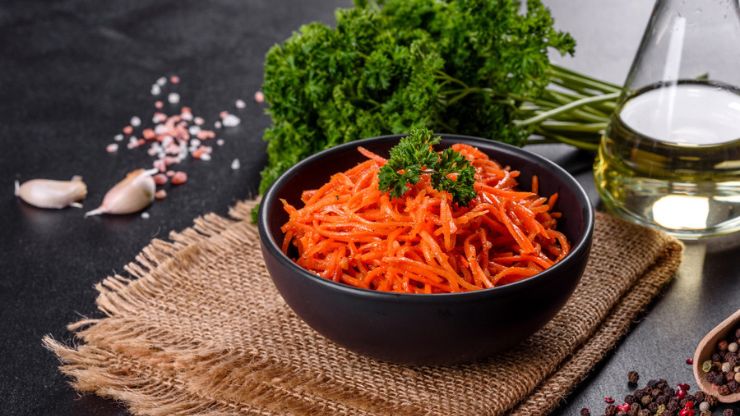Welcome to a journey through the tantalizing world of kimchi, the beloved Korean side dish that not only pleases the palate but also offers an array of surprising health benefits. Beyond its fiery and tangy flavors, kimchi is a nutritional powerhouse brimming with probiotics, vitamins, minerals, and antioxidants. In this article, we’ll unveil the five surprising health advantages of kimchi that elevate it from a culinary delight to a wellness wonder.
From its role as a probiotic powerhouse, promoting a healthy gut microbiome, to its potential as an aid in weight management, kimchi’s diverse array of benefits may astonish you. We’ll delve into how its rich nutrient content supports your well-being, its potential anti-aging properties, and how to seamlessly incorporate this superfood into your diet.
Discover how a humble condiment can be a key player in your journey toward a healthier, more vibrant you. Join us as we explore the unexpected health perks of kimchi, making it a staple in your diet and a secret to your vitality.
Table of Contents
ToggleHealth Benefits of Kimchi

1. Probiotic Powerhouse
One of the most well-known health benefits of kimchi is its probiotic content. Kimchi is a fermented food, which means it’s teeming with beneficial bacteria, particularly lactic acid bacteria such as Lactobacillus and Bifidobacterium. These probiotics promote a healthy gut microbiome, aiding digestion, boosting the immune system, and possibly even supporting mental health.
A balanced gut microbiome is crucial for overall health. It helps your body absorb nutrients from the foods you eat and plays a significant role in your immune system. The probiotics in kimchi can help maintain this balance and support a healthy gut.
Also Read- Curtido: Kimchi’s Central American Cousin
2. Rich in Nutrients
Kimchi is not just a delicious condiment; it’s also packed with essential nutrients. It’s low in calories but provides an array of vitamins and minerals. A typical kimchi recipe includes ingredients like napa cabbage, garlic, ginger, and red pepper flakes, all of which contribute to its nutritional profile.
Napa cabbage, the primary ingredient in kimchi, is an excellent source of vitamins A, C, and K, as well as folate and minerals like calcium and iron. Garlic and ginger add antioxidants, and red pepper flakes provide vitamin C and capsaicin, which has been linked to various health benefits, including pain relief and improved metabolism.
3. Potential Weight Management
For those on a weight management journey, kimchi might become your new best friend. Kimchi’s spicy kick comes from red pepper flakes, which contain capsaicin, known for its potential to increase metabolism and reduce appetite. These properties can aid in weight control.
Additionally, the fiber content in kimchi, primarily from napa cabbage, can help you feel fuller for longer, reducing the urge to snack between meals. A balanced and controlled appetite is a significant factor in maintaining a healthy weight.
4. Antioxidant Properties
Kimchi boasts a variety of ingredients with potent antioxidant properties. Antioxidants play a crucial role in protecting your cells from oxidative stress and the damage caused by free radicals. Garlic, ginger, and red pepper flakes found in kimchi are rich in these compounds.
These antioxidants can help reduce inflammation, lower the risk of chronic diseases, and support overall health. Regular consumption of kimchi can be a tasty way to incorporate these beneficial compounds into your diet.
5. Potential Anti-Aging Effects
The antioxidants present in kimchi don’t just support your internal health; they may also have external benefits. The vitamins and minerals in kimchi, along with its anti-inflammatory properties, can contribute to healthier skin. Some Korean skincare products even incorporate kimchi extracts due to its potential anti-aging effects.
While eating kimchi may not be a direct route to eternal youth, its nutrient-rich composition and antioxidants can certainly contribute to healthier skin and overall well-being.
How to Incorporate Kimchi into Your Diet
Now that you’re aware of the health benefits of kimchi, you might be wondering how to incorporate it into your diet. Here are some delicious and creative ways to enjoy this Korean delicacy:
Don't just scroll, subscribe!
BuzzTrail's unique web-stories are the cure for boredom you've been waiting for.
- Kimchi as a Side Dish: The traditional way to enjoy kimchi is as a side dish. Serve it alongside rice, noodles, or any other main course. Its spicy and tangy flavors complement a wide range of dishes.
- Kimchi Fried Rice: Add chopped kimchi to your fried rice for a flavorful twist. The kimchi will infuse the dish with its unique taste, and the probiotics will remain intact, as cooking kimchi doesn’t necessarily kill the beneficial bacteria.
- Kimchi Pancakes (Kimchijeon): Kimchi pancakes are a popular Korean snack or appetizer. They are simple to make by mixing kimchi with a batter and pan-frying until crispy and golden.
- Kimchi Tofu Stir-fry: Create a quick and healthy stir-fry by combining tofu, vegetables, and kimchi. The spicy and savory flavors of kimchi enhance the overall taste of the dish.
- Kimchi Stew (Kimchi-jjigae): This classic Korean stew is made by simmering kimchi with tofu, pork, or other proteins. It’s hearty, flavorful, and perfect for a cold day.
- Kimchi Tacos or Wraps: Use kimchi as a unique and spicy topping for your tacos or wraps. Its bold flavors can add a zesty kick to your favorite fillings.
- Kimchi Burger: Elevate your burger game by adding a layer of kimchi. The crunch and spice will take your burger to a whole new level.
Cautions and Considerations
While kimchi offers numerous health benefits, there are a few considerations to keep in mind:
- Spice Level: Kimchi can be quite spicy due to the red pepper flakes. If you have a low tolerance for spicy foods, look for milder variations or adjust the amount of kimchi you consume.
- Sodium Content: Traditional kimchi can be high in sodium due to the salt used in the fermentation process. If you’re on a low-sodium diet, it’s essential to consume kimchi in moderation.
- Fermented Foods: If you’re new to fermented foods, introduce kimchi gradually to allow your digestive system to adapt to the probiotics it contains. Consuming large quantities right away may lead to digestive discomfort.
- Allergies: Be aware of any allergies to the ingredients in kimchi, such as shellfish (often found in kimchi with added seafood) or gluten (sometimes found in certain types of kimchi).
For More- Make Delicious Homemade Kimchi
Is Kimchi Good for You?
Yes, kimchi is exceptionally good for you. This iconic Korean side dish is not only a culinary delight but also a nutritional powerhouse that offers a range of health benefits.
Probiotic Powerhouse
Kimchi is often heralded as a “probiotic powerhouse” due to its robust content of beneficial bacteria, primarily lactic acid bacteria such as Lactobacillus and Bifidobacterium. These probiotics play a crucial role in promoting a healthy gut microbiome, which is essential for overall well-being. They aid in digestion, assist the body in absorbing essential nutrients, and bolster the immune system’s defenses.
Probiotics in kimchi thrive during the fermentation process, creating an environment where they can flourish and thrive in your gut. This not only enhances the digestive process but can also have far-reaching effects on health, potentially supporting mental well-being and helping to prevent various digestive disorders. The probiotic richness of kimchi is one of the key reasons why it is celebrated as a superfood that nourishes both your taste buds and your gut.
Nutrient-Rich
Kimchi is not just a flavorful delight but a nutrient-rich addition to your diet. Its primary ingredient, napa cabbage, is a notable source of essential vitamins and minerals. This includes vitamin A, known for supporting healthy vision and a robust immune system. It’s also a rich source of vitamin C, celebrated for its antioxidant properties and role in collagen production. Vitamin K, another vital component, contributes to blood clotting and bone health.
Furthermore, kimchi contains minerals like calcium, crucial for bone strength, and iron, which is essential for oxygen transport in the body.
Weight Management
Kimchi can be a helpful ally in weight management due to several factors. First, it contains red pepper flakes, which are a source of capsaicin, a compound known for its potential to boost metabolism and reduce appetite. This can lead to a controlled and balanced calorie intake, supporting weight control.
Additionally, kimchi’s fiber content, primarily from napa cabbage, can help you feel fuller for longer periods. A balanced and controlled appetite is crucial for those looking to manage their weight effectively. The satisfying crunch and complex flavors of kimchi can also add variety to your diet, making it easier to stick to a weight management plan.
Antioxidant Properties
Kimchi boasts a wealth of antioxidant properties, thanks to the ingredients it incorporates. Garlic, a staple in kimchi recipes, is renowned for its antioxidants that combat oxidative stress and protect cells from damage. Ginger, another common addition, brings its own set of antioxidants, contributing to overall well-being.
The red pepper flakes used in kimchi provide a potent source of antioxidants. These compounds are essential in reducing inflammation and lowering the risk of chronic diseases. Antioxidants play a crucial role in maintaining good health by neutralizing free radicals in the body, which can lead to cellular damage and various health issues.
Potential Anti-Aging Effects
Kimchi’s potential anti-aging effects extend beyond its delicious flavor. The antioxidants found in kimchi, such as those from garlic and ginger, play a role in protecting your skin and promoting a youthful appearance. These antioxidants combat oxidative stress and free radicals, which are known to contribute to premature aging and skin damage.
Furthermore, the vitamins and minerals in kimchi, including vitamins A and C, support skin health. Vitamin A aids in skin cell regeneration and repair, while vitamin C promotes collagen production, which is crucial for maintaining skin elasticity and reducing wrinkles.
Conclusion
In the world of culinary delights, kimchi stands out not only for its bold flavors but also for its surprising health benefits. As we’ve explored in this article, kimchi is more than just a delicious side dish – it’s a probiotic powerhouse that supports gut health, a rich source of nutrients, and an unexpected ally in weight management. Its antioxidant properties and potential anti-aging effects add to the list of reasons to savor this Korean classic.
With kimchi, you can have your cake and eat it too – or in this case, enjoy a flavorful dish that also contributes to your overall well-being. Its adaptability and versatility make it a versatile addition to your diet. So, embrace the world of kimchi, and let its unique taste and health advantages be your culinary secret to a healthier, more vibrant life.
FAQs
How can I incorporate kimchi into my diet if I don’t enjoy spicy food?
How can I incorporate kimchi into my diet if I don’t enjoy spicy food?
If you’re not a fan of spicy kimchi, look for milder variations, or adjust the quantity you consume. Some types of kimchi, like white kimchi, are less spicy and offer a milder taste.
Are there any dietary restrictions for consuming kimchi?
Are there any dietary restrictions for consuming kimchi?
People with allergies to ingredients in kimchi, such as shellfish (found in some seafood kimchi) or gluten (in certain kimchi types), should be cautious. Additionally, those on low-sodium diets should consume kimchi in moderation due to its salt content.
Can kimchi help with digestion?
Can kimchi help with digestion?
Yes, kimchi contains probiotics that can aid in digestion by promoting a healthy gut microbiome. It may help with nutrient absorption and digestive health.

